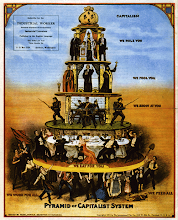Profits, however, depend on two things: the amount of value that gets created (output) and the share of that value that goes to profits. With a high level of unemployment, workers are in a poor position to demand higher wages—i.e., a larger share of that value. So businesses, and the wealthy who get their income from owning businesses, do not want unemployment to fall too low—low enough to give workers more bargaining power.The weak position of workers in the current economic situation affects more than wages. While a recession lasts, businesses are able to implement changes more readily than in “normal” times. For example, they can change work rules, get rid of older workers, and bring in new technology more easily, as workers are in a poorer position to resist change. Also, the “shock” imposed on society by bad economic conditions can be used in the political sphere, making it possible for businesses and the wealthy to obtain concessions from government—the tax incentives state governments offer, for example, in the hope of generating some local growth. (However, an economic crisis also opens up possibilities for changes in the other direction. Consider, for example, the progressive changes in the United States that came out of the Great Depression of the 1930s.)From the perspective of the wealthy, then, perhaps a bit more growth would be better, but not so much as to weaken their positions. Most important, if that growth required the government to spend a lot more by running deficits, the wealthy are not interested. They fear that high deficits now mean more taxes down the line. In part, higher taxes could be needed to pay off the debt the government would incur when it ran those deficits. Perhaps more important, upping government spending today threatens to entrench a long-run higher level of government activity, which would require higher taxes on a permanent basis. The wealthy might be able to push the tax obligations onto lower income groups. Yet, with income inequality as great as it is, it’s hard to get much more out of anyone but the wealthy. You can’t get blood from a stone.
Saturday, January 22, 2011
Class Struggle, We Are Losing (another link dump with a quote)
Labels:
Marx and Marxishness,
Thats capitalism
Subscribe to:
Post Comments (Atom)




No comments:
Post a Comment